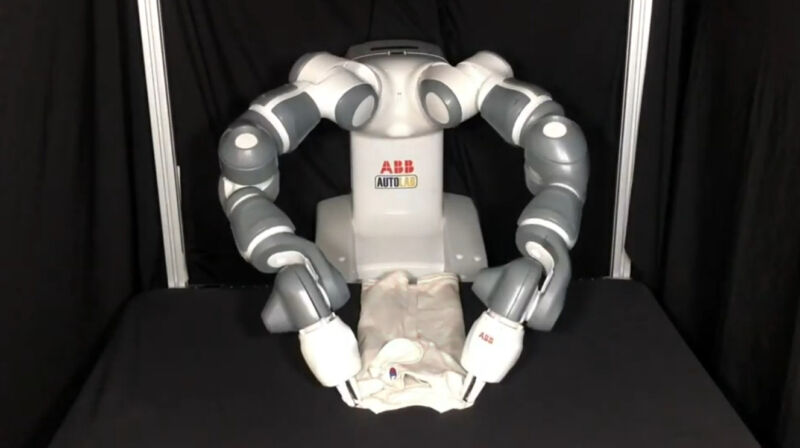
reader comments
28 with 23 posters participating
While it’s possible that someone out there enjoys folding clothes, it’s probably not a beloved pastime. Accordingly, researchers at UC Berkeley’s AUTOLAB have developed a new robotic method of folding garments at record speed (for a robot) called SpeedFolding.
Using machine vision, a neural network called BiManual Manipulation Network (BiMaMa-Net), and a pair of industrial robot arms, SpeedFolding can fold 30–40 randomly positioned garments per hour, usually finishing each within two minutes.
While that rate does not sound impressive compared to a human, previous robotic garment-folding methods reached only “3-6 FPH” (that’s “folds per hour”) according to the researchers in a paper submitted for presentation at IROS2022 next week in Kyoto. It’s the work of Yahav Avigal, Tamim Asfour, Torsten Kröger, and Ken Goldberg of UC Berkeley and Lars Berscheid of Karlsruhe Institute of Technology.
Speed achievement aside, the paper is worth a read to enjoy how the researchers describe the garment-folding problem in technical terms. “Folding garments reliably and efficiently is a long-standing challenge in robotic manipulation,” they write, due to “complex dynamics” and the “high dimensional configuration space of garments.” In other words, clothes wrinkle up easily, and they can be all over the place. In response, they’ve come up with a “bimanual system” (using two hands) that can smooth out a crumpled garment, then fold it along preferred folding lines given by the researchers.
YuMI IRB 14000) costs $58,000, so dreams of running SpeedFolding at home are not currently within the reach of a typical household. But the technique might eventually filter down to household robotics.
For now, the paper’s authors mention “textile manufacturing and logistics, industrial and household laundry, healthcare, and hospitality” as potential applications for the technology. For people who don’t enjoy folding and sorting clothes, it’s likely that this aspect of our potential future can’t get here soon enough.






